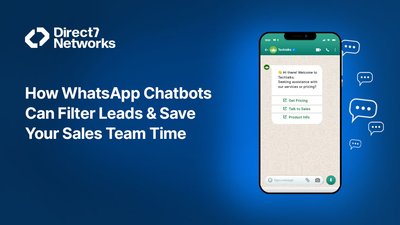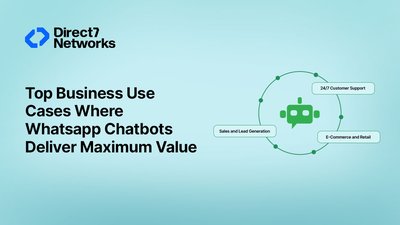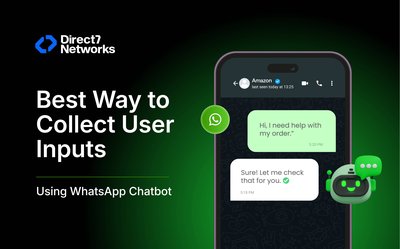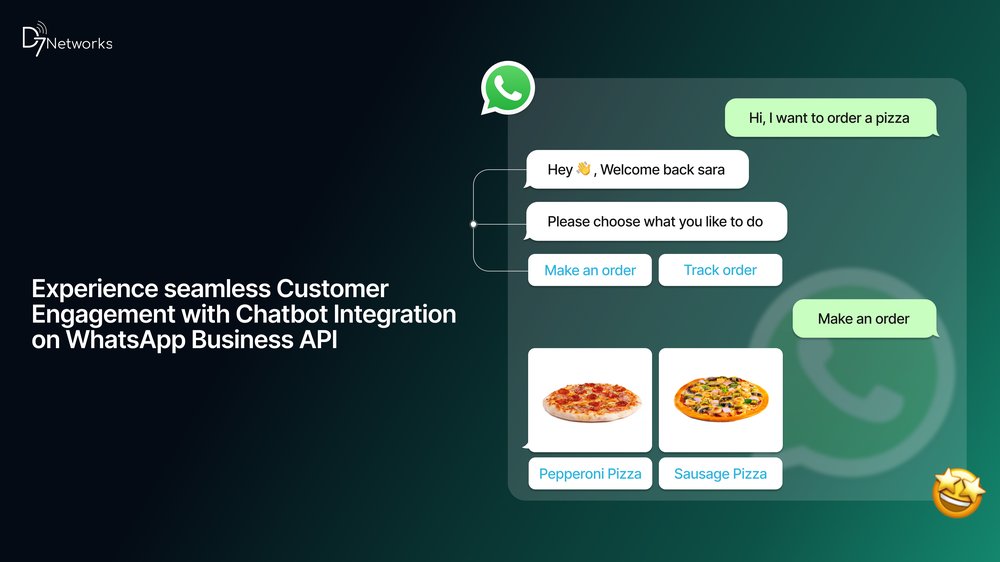
WhatsApp Chatbot API for Enhanced Customer Engagement
Discover how businesses can optimize their customer engagement strategy by leveraging the power of WhatsApp Chatbot API.
In today's highly-connected, fast-paced business world, companies are always searching for new and innovative methods to enhance communication, simplify operations, and improve customer satisfaction. One solution that has quickly become popular is WhatsApp Chatbot API. With more than 2 billion people using it, WhatsApp is one of the most used messaging platforms in the world which makes it an ideal platform for businesses to interact with their customers. WhatsApp chatbots made possible by WhatsApp Business API, are changing the way businesses interact with their customers through automatizing responses and providing real-time assistance.
Are you ready to transform customer communications? Start building your WhatsApp Chatbot with D7 Networks today and improve your operations!
What exactly is the WhatsApp Chatbot API? And why should businesses think about including it in their business? In this comprehensive guide, we'll discuss the way WhatsApp chatbots function, their benefits, and why businesses ought to seriously consider including them into their customer service strategy.
What is the WhatsApp Chatbot API?
WhatsApp Chatbot API allows businesses to integrate chatbots that are automated into chatbots on the WhatsApp platform to manage customers' interactions, address questions and provide support. This API lets companies harness the potential of automation to improve communications and deliver customers with a seamless experience without the need for a person to oversee every conversation.
In contrast to the standard WhatsApp Business App, which is better suited for small-sized businesses however, the WhatsApp Business API is specifically made for large to medium-sized companies, which allows the company to manage large amounts of customer interactions effectively. By using this API, businesses can utilize chatbots to provide 24/7 support, customized responses, as well as assist in arranging appointments, transactions and tracking orders.
How Does the WhatsApp Chatbot API Work?
The WhatsApp Chatbot API connects directly into a company's communications infrastructure, allowing chatbots to communicate with customers through WhatsApp. This API makes use of automated responses based upon established rules and techniques such as natural processing of languages (NLP) as well as artificial intelligence (AI) to deliver intelligent and contextually aware responses.
Here's an overview of the way it works:
- The user sends a text message A client sends an email to the company's WhatsApp number.
- Chatbot analyzes the message by: The chatbot analyzes the message by either using a set pre-programmed keywords, or by using AI to determine the intent of the user.
- Automated response: based on the results of the analysis of the chatbot, it sends an answer that is appropriate or sends it to an agent in the event of a need.
Why Should Businesses Consider Using WhatsApp Chatbots?
There are a myriad of reasons companies should seriously think about the possibility of integrating WhatsApp chatbots in their communication strategy:
- Unmatched Users: With more than two billion users active, WhatsApp offers businesses access to a huge and varied audience.
- Engaged Rates of High Quality: Research shows that WhatsApp messages are open to 98% of users rate, much higher than other methods of communication.
- 24/7 availability: WhatsApp chatbots allow businesses to provide support 24/7 offering a superior customer experience, without requiring more staff.
- Chatbots with Multi-Language Capabilities: Many chatbots are able to handle several languages, which means that companies can reach out to an international public.
- Scalability: For businesses that handle massive volumes of inquiries from customers chatbots can be easily scaled to ensure smooth operations in peak times.
Benefits of Using WhatsApp Chatbot API
There are many advantages to utilizing the WhatsApp Chatbot API and each one will significantly affect a company's effectiveness, customer satisfaction, and profit.
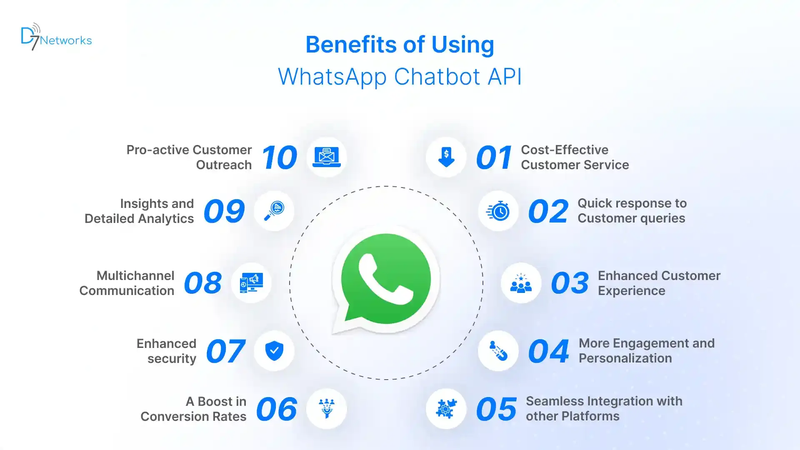
1) Cost-Effective Customer Service
Automating customer interactions decreases the requirement for a massive team of service personnel. Utilizing chatbots to answer routine questions, companies can cut expenses while ensuring high-quality customer service. Human agents are free to handle more difficult questions that require a personalized contact.
2) Quick response to customer queries
In a time when customers are expecting instant responses, chatbots are able to respond to queries within a matter of minutes. It doesn't matter if it's answering commonly asked questions supplying product information or assisting with basic problems or issues, chatbots on WhatsApp chatbot are able to provide fast and precise responses throughout the day.
3) Enhanced Customer Experience
With the capability to offer 24/7 support, customers will not need to stand in line or wait during business hours to obtain answers. Chatbots can handle simple questions while directing more complex problems to a human to ensure a seamless and pleasant customer experience.
4) More Engagement and Personalization
WhatsApp chatbots can be personalized to offer personalized responses according to the customer's habits and preferences. For instance, the chatbot will provide recommendations for products in response to previous purchases as well as browsing habits, increasing customer engagement and conversion rates.
5) Seamless integration with other Platforms
WhatsApp Chatbot API allows integration with CRM platforms, e-commerce platforms as well as customer databases. This lets businesses provide customized service, monitor the history of orders, schedule appointments, and offer pertinent information right in chat, all within one location.
6) A Boost in Conversion Rates
Because WhatsApp is so popular and has high engagement as well as open rate, it offers an ideal setting for businesses to turn leads to customers. Through instant response and a seamless experience for customers, WhatsApp chatbots can help companies convert leads faster than conventional methods.
7) Enhanced security
WhatsApp utilizes end-to-end encryption to ensure the security and privacy of messages. This means that both business and users can safely communicate and with confidence. This is particularly important when sharing sensitive data like payment information or personal information.
8) Multichannel Communication
WhatsApp Chatbot API lets companies manage several communication channels simultaneously, which allows users to communicate with their customers across multiple platforms within one system. This means more efficient monitoring and organization of interactions with customers.
9) Insights and Detailed Analytics
WhatsApp chatbots track a variety of metrics like messaging delivery, response time and satisfaction of customers. These data can assist businesses improve their communication strategies as well as improve chatbot performance using actual information.
10) Proactive Customer Outreach
Businesses can utilize WhatsApp chatbots for proactive communication to send reminders, updates or offers to their customers. For example, a shop can inform customers about coming sales, as well as a company could remind customers about an appointment.
Take advantage of 24/7 customer service, customized experiences as well as seamless integration. Sign up with D7 Networks today and find out how easy it is to start.
Features and Capabilities of the WhatsApp Chat API
WhatsApp Chat API offers an array of capabilities and features that make it a vital tool for businesses seeking to improve customer interaction. Here are a few essential features:
1) Automated Responses
WhatsApp chatbots are able to handle many customer inquiries automatically, providing immediate responses based upon defined rules or AI-driven reasoning.
2) Rich Media Messaging
The WhatsApp API allows users to send rich media, like videos, images, or files. This allows businesses to give more interesting and relevant responses. For example, a company could send a catalog of its products or a video on how-to.
3) Multi-Language Support
Through using the WhatsApp Chat API, you can develop chatbots that connect with customers across multiple languages, providing global access and improved customer service.
4) Seamless Integration
WhatsApp API WhatsApp API is compatible with databases, CRMs and other platforms. This allows businesses to access customer data and track previous interactions and offer a personalized experience.
5) Two-Way Communication
Companies can send out messages, notifications, updates and other messages via WhatsApp's WhatsApp chatbot, as well as providing customers with the option to respond to questions, request clarifications or get help in real-time.
6) End-to-End encryption
WhatsApp guarantees the messages sent are protected through encryption that is end-to-end, safeguarding private customer information and ensuring an environment for secure communication.
7) Proactive Notifications
Utilizing this API, the WhatsApp Chat API, businesses can contact customers via appointment reminders or payment notifications as well as promotions, thereby improving customer engagement and satisfaction.
Best Practices for Utilizing WhatsApp Chatbots
To ensure that your WhatsApp chatbot is providing the best experience to your clients, adhere to these guidelines:
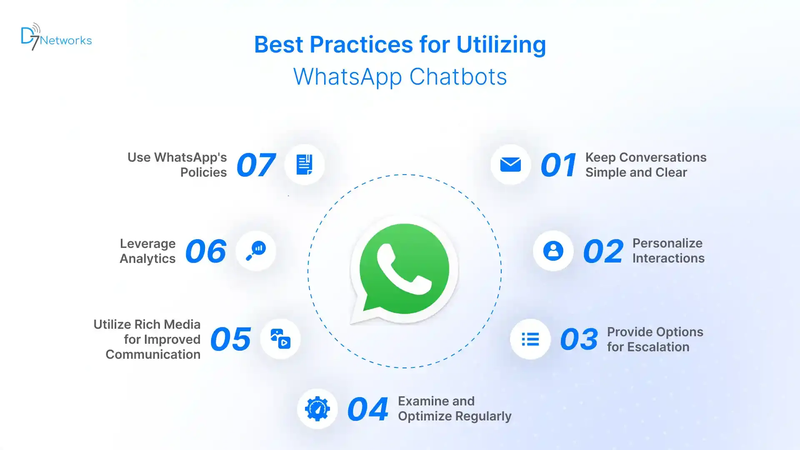
1) Keep conversations simple and clear
The chatbot's responses should be simple and succinct. Don't overwhelm your clients with too much information all at one time, and help them step-by-step through every interaction.
2) Personalize Interactions
Personalization is a powerful way to increase the customer's engagement. Make use of the data from your CRM or past interactions to provide customized responses, recommendations and product suggestions.
3) Provide Options for Escalation
While chatbots are fantastic to handle routine tasks, there are some questions that require the assistance of a human. Always provide customers with the alternative to refer their question to a live person if needed.
4) Examine and Optimize Regularly
The success of your chatbot is contingent on the degree to which it is able to handle real-time interactions. Always test your chatbot on a regular basis, take feedback from your customers, and continue to improve its chat-bot's flow and capabilities.
5) Utilize Rich Media for Improved Communication
Make the most of the rich multimedia capabilities of WhatsApp by sending pictures and videos to improve communication. For instance, instead of simply sending text messages add a useful informational graphic or video.
6) Leverage Analytics
Check the performance of your chatbot by monitoring metrics such as response time, success rate, and satisfaction. Make use of this information to optimize your chatbot's performance and offer an improved customer experience.
7) Use WhatsApp's Policies
Check that you ensure that your WhatsApp chatbot is adhering to WhatsApp's guidelines and policies to prevent any interruptions to service. Unlawful use of the API could result in being suspended or terminated or cancellation of account.
Why Use D7 Networks to Create a WhatsApp Chatbot?
D7 Networks is a trusted service that provides an API solution for SMS as well as messaging, such as WhatsApp. Through D7 Networks, businesses can use their WhatsApp Business API and create chatbots that can automate customer interactions without the requirement for huge development resources.
Here are a few benefits of making use of D7 Networks for your WhatsApp chatbot:
- User-Friendliness: Its platform is user-friendly and offers integration tools that ease the process of establishing and managing the operation of a WhatsApp chatbot.
- Cost-effective: You can build an initial WhatsApp chatbot for free, and only pay for more advanced features or greater volumes of messages.
- Dependable Services: D7 Networks is known for its secure and reliable messaging system, which ensures smooth communications even in times of high traffic.
How to Create a WhatsApp Chatbot Using D7 Networks
The process of creating your own WhatsApp chatbot using D7 Networks is a straightforward procedure that doesn't require any technical expertise. Take these simple steps make your chatbot at no cost:
1) Register for D7 Networks
Start by registering an account by logging onto D7 Networks. D7 Networks platform. They provide various communication services that include WhatsApp Business API integration. Once you have signed up for WhatsApp, confirm your account by your email.
2) Gain Access for the WhatsApp Business API
D7 Networks provides access to the WhatsApp Business API which is needed to develop and maintain your WhatsApp chatbot. You'll need to make an application for access to this API and provide the details of your company. This ensures that WhatsApp allows your use of the platform for business use.
3) Create a WhatsApp Business number
After your API access has been granted, you must connect to a WhatsApp Business number. This is the number that the chatbot will communicate with customers. Be sure to select the number that isn't already associated with an individual WhatsApp account.
4) Create the Chatbot's Conversation Flow
In order to build a powerful WhatsApp chatbot, you'll have to create the flow of conversations. Find out what types of queries that customers will respond to and the solutions it'll provide. The majority of businesses start with basic tasks such as responding to FAQs as well as tracking orders, or arranging appointments.
5) Utilize D7 Networks API Documentation
D7 Networks provides detailed API documentation that will help you integrate your chatbot with your system. You can make use of the templates or modify your chatbot based on your company's requirements. The API lets you automate responses, collect data about customers, and incorporate third-party tools.
6) Check Your Chatbot
Before making your chatbot live, test your chatbot and ensure that it is working properly. Send out a few sample questions and observe whether the chatbot replies. Adjust the flow of conversation and then refine responses as required.
7) Watch Live, then Monitor
When you're happy with the performance of your chatbot, it's time to go live! Promote the WhatsApp phone number via your social media, website and other points of contact for customers. Continuously check performance and improve in response to feedback.
If you require help with the integration of AI capabilities or customizing the flow of conversations, get in touch with our customer service team. They can help you design your chatbot to suit your needs.
Integration of with the WhatsApp Chatbot API to D7 Networks
Businesses in various industries and of different sizes can leverage chatbots on D7 WhatsApp API to enhance customer service and communication. These chatbots can be tailored to meet specific business requirements and brand identity. They are designed with stringent security protocols that ensure the privacy and protection of user data. The overall integration costs vary based on factors such as the chatbot's complexity, integration requirements, and ongoing maintenance.

